Is ‘healthy eating’ a concept that only applies to the more fortunate among us?
Raadhika Gupta, a lawyer and a Harvard Law School graduate, went in search of answers in 2018. In her quest, she connected with Amit Gupta, a former ‘Teach For India’ fellow.
(Above feature image is representational in nature courtesy Shutterstock)
Later that year, they set up the Foodshaala Foundation, a non-profit. By the end of 2019, their foundation set up community kitchens that were serving daily nutritious meals to more than 1,500 children from low-income communities in Gurugram district. But when India was sent into lockdown in March 2020 and schools shut down, everything changed for Raadhika and Amit.
Since then, Foodshaala has primarily focused on spreading awareness among children from low-income families, their teachers and parents about health and nutrition in schools through their flagship School Nutrition Awareness Program, where they empower them with knowledge.
The program uses gamification to incentivize children to take real steps towards behaviour change, “leading to improvements in knowledge, attitude and behaviour of children towards healthy eating, increase in diet diversity and reduction in consumption of junk food,” notes Raadhika, in a conversation with The Better India.
Thanks to their efforts, healthy and nutritious foods like sprouts, fruits, millets and leafy vegetables have made it to the plates of many children from the marginalised sections.
Overall, through their awareness programs, Foodshaala has reached out to more than 1,500 children across low-income communities in Gurugram, Hyderabad, Mumbai and Pune, although their “core area of focus for offline sessions” is primarily in the Delhi-NCR region.
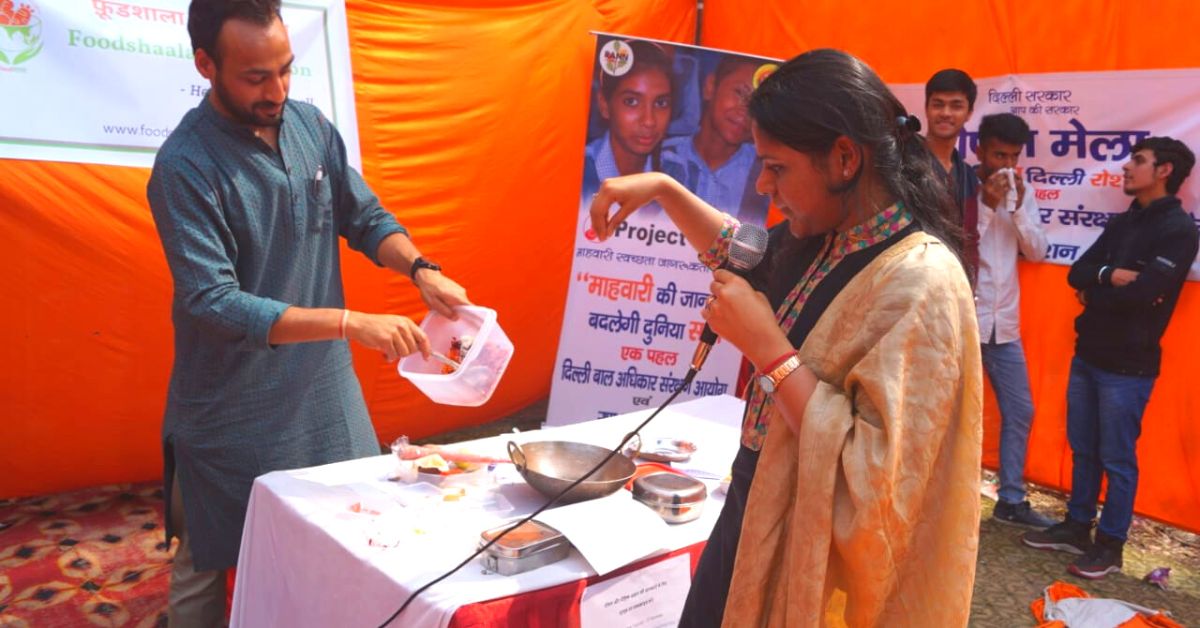
Couple with a mission
Raadhika first met Amit on a matrimonial site in 2018. Working as a legal consultant with the World Bank, she had envisioned the concept of setting up a community kitchen in a low-income neighbourhood and aiding the cause of food and nutrition for children from such communities.
“Amit had completed his fellowship with Teach for India and was working in the education sector at that point. He also had a great level of interest in social work. We both connected on this subject and today we are a married couple,” says Raadhika.
“When I met Raadhika in 2018, I was at a stage where I wanted to do something beyond my everyday corporate job related to food and fitness. When I spoke to her, I figured out that she was keen to create an impact. This helped us connect and take things forward,” says Amit, an MBA graduate from XLRI, Jamshedpur, who also holds a diploma in nutrition and public health.
Before starting Foodshaala, Raadhika volunteered extensively with NGOs in food distribution. She also did a fellowship at the School for Social Entrepreneurs India.
Amit says, “During my fellowship with Teach for India, I was working with students across schools from low-income communities. I realised that the problem of junk food is very much prevalent there as well. While the lack of access to healthy food was a reason, there was also the lack of awareness about nutrition and what’s right for them to eat.”
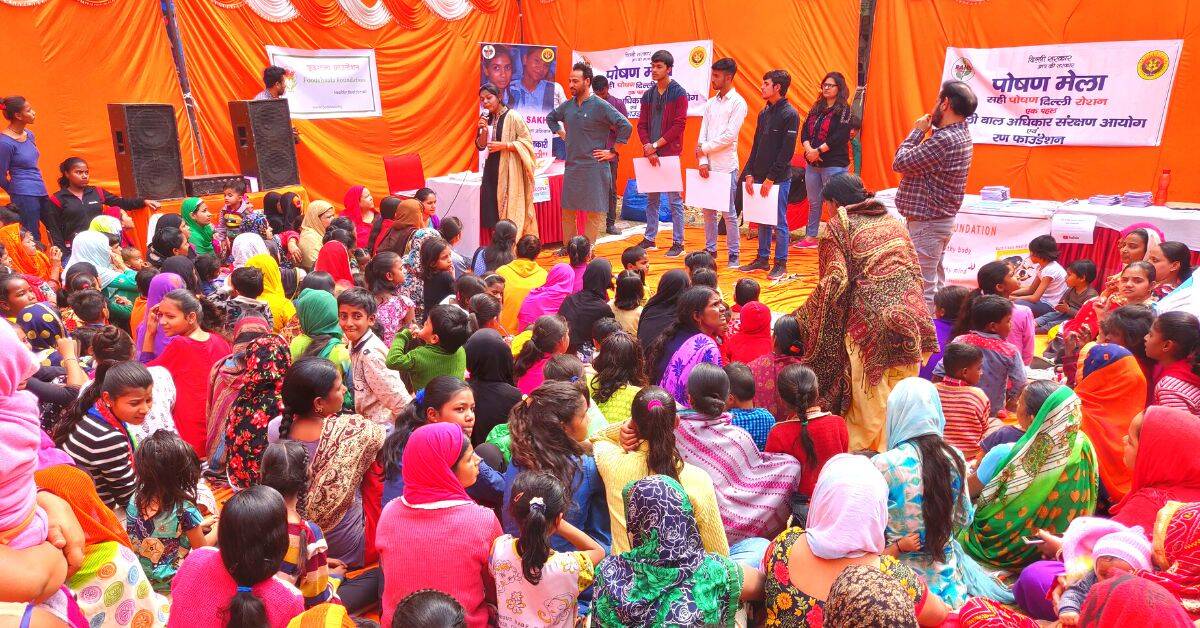
Community kitchen
Raadhika explains the rationale behind the community kitchen: “Our idea was to have a sustainable structure within the community which would be a source of healthy food for the people in that community. We hired women from the community itself and we trained them to cook nutritious food using their local ingredients. Adding a salad to their meals, making little tweaks in the recipe to make it more healthy by striking a balance of micro and macronutrients were the areas that we focused on.”
More specifically, the food that they provided was primarily familiar dishes like sandwiches, dal (lentils), rice, pav bhaji, etc. “But the ingredients we used to prepare these dishes were not the conventional ones. For example, the filling we used in our sandwich was not potato, instead, we used soya. We added a lot of green leafy vegetables into the noodles that the children loved to eat. We prepared pooris using red and green spinach instead of the maida that was previously prepared. The colour of these pooris attracted children,” she adds.
Through Fooshaala they wanted to make communities realise that it is not very expensive or complex to make healthy food. “They could do it with the ingredients they had access to. Most ingredients were also sourced from the local vendors in the community itself,” says Amit.
“In private schools, we started by serving these meals for Rs 18-25. Here, our message to the children, parents and teachers was to spend money on healthy food over junk food. We started this with one school in Nathupur village, Gurugram. The concept saw good acceptance and this resulted in us expanding to five more schools in a short time. We also got into an agreement with an NGO-run school called The VIDYA School in Nathupur village in Gurugram to serve mid-day meals to more than 1,000 children daily,” says Raadhika.
The fixed cost of setting up a community kitchen was approximately Rs 35,000. “We also had expenses in paying out the rent and the salary for our employees who were from the local community. In setting up the bigger kitchen to serve daily mid-day meals for more than 1,000 children the expenses were estimated to be closer to Rs 2 lakhs,” claims Raadhika.
When Covid struck in the early months of 2020, they had to shut down their community kitchens. “We realised that rather than serving one meal it will be much more impactful if we teach people within the communities how to prepare these meals and that’s how we shifted our focus towards the awareness programs. This had a much larger impact as many people were getting empowered to take the message further within their communities,” says Amit.
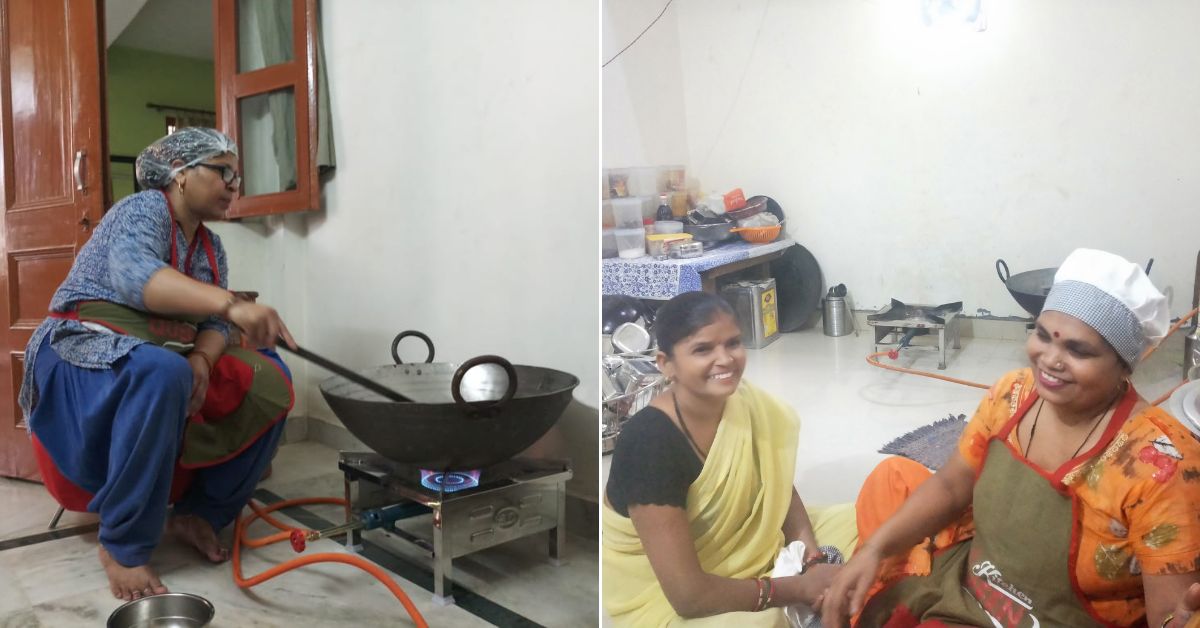
Raising awareness for better nutrition
Fooshaala has expert nutritionists – like Dr Rupal Dalal, a paediatrician and adjunct professor at IIT-Bombay, Dr Ratnaraje Thar, a renowned nutritionist, and Sonam Jain, a certified dietician – working with them. They help develop recipes and advise them on the curriculum for their nutritional awareness sessions.
“At present, our focus is on awareness sessions that empower people within the communities to start eating healthy food without stretching their budget for food,” says Amit.
“We run a structured awareness program. These children are mostly school students from classes 6 to 8 from low-income communities. The majority of their parents are engaged in daily wage work, while others are rickshaw drivers and janitors. Each awareness program by Foodshaala consists of six workshops. These workshops cover topics like macronutrients, micronutrients, diet diversity, how to read food labels, harm caused by junk food, etc.,” says Raadhika.
The program module includes practical sessions where children plan what goes on their plates. “They need to have at least four colours on their plate and this will ensure a good composition of vegetables and fruits in the plate. The children are then asked questions about which food on their plate is giving them carbohydrates, protein and so on. They are also given a three-week diet tracking challenge. Based on this, they are given scores every week,” she adds.
Instead of just teaching them what food is to be eaten, Foodshaala helps create an understanding among these children on how to choose the right foods. For example, the difference between simple carbohydrates and complex carbohydrates helps them understand why sugar or maida is not a great source of carbohydrates even though it has them.
“Instead of maida, we request them to eat as much whole wheat as possible like rotis or parathas made from regular wheat flour. For sugar, we just make them aware of how harmful it is to their health and the number of ways in which they are consuming it in a can of Coke, a packet of biscuits or a spoon of milk powder. We inform them that they shouldn’t have more than 5 teaspoons or 25 g of sugar every day,” says Raadhika.
“Protein consumption among vegetarians is another area we enlighten the children on. We suggest having a balanced meal which has a combination of greens and pulses,” says Amit.
Before conducting these programs, they first run surveys in schools to understand the eating habits of children. They also interact with the children, teachers and in some cases parents too. This gives them a clear understanding of what they are consuming and what food they have access to. The recipes they suggest are primarily developed from the available ingredients.
“The awareness program we run is called ‘School Nutrition Awareness Program (SNAP)’. When we conduct workshops in schools we call it ‘Food Funda’. We started these programs during the first wave of Covid-19 when children were attending classes virtually. We started the sessions online and now we run the sessions offline as well,” says Amit.
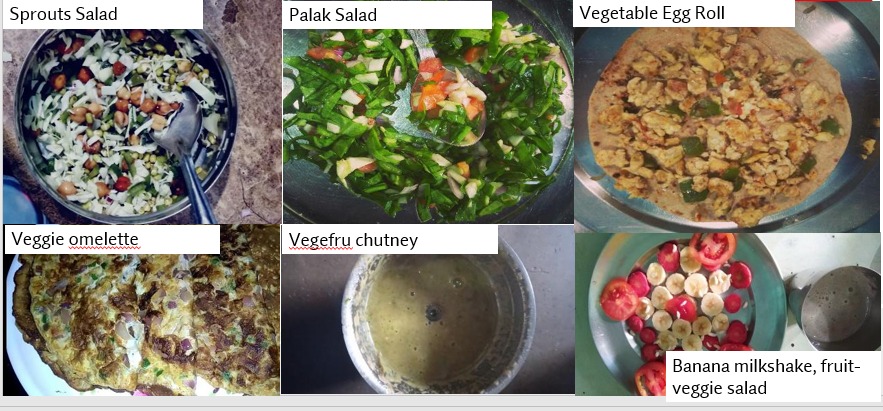
As an addition to the existing program, they are working on developing modules for parents and teachers. These modules involve cooking sessions, hacks to sneak healthy ingredients into a recipe that the children like to eat and also to give them tips on how to grow healthy vegetables at their home itself.
They have also conducted awareness sessions named the Poshan Mela in partnership with the Delhi government for women from lower-income communities. In a program organised by Foodshaala in New Delhi earlier this year, more than 12,000 children were given nutrition kits, following which they cut down on their junk food consumption by 70%, claims Amit.
Fun and games
In the beginning, they divide children into teams. Children are then asked questions in the classroom about nutrition and health, and points are added to the score of whichever team answers correctly. Whatever recipe challenges they ask them to do at home, they also get points. They add these individual challenges to team points. In the end, a team is declared the winner and they get some small prizes for it.
“This motivates them to listen in class. We also do a 21-day tummy tracker challenge which measures diet food diversity and junk food consumption. Children score themselves here. If they’ve eaten any fruit today or consumed an adequate amount of water, they give themselves 1 point. If they consume some junk food, they give themselves -1. Once they achieve a particular score in Week 1, we ask them to set targets for themselves for the following week. In this game format, on a week-by-week basis, they’re trying to beat their own scores, and this helps them improve their behaviour in diet diversity and junk food reduction,” says Raadhika.
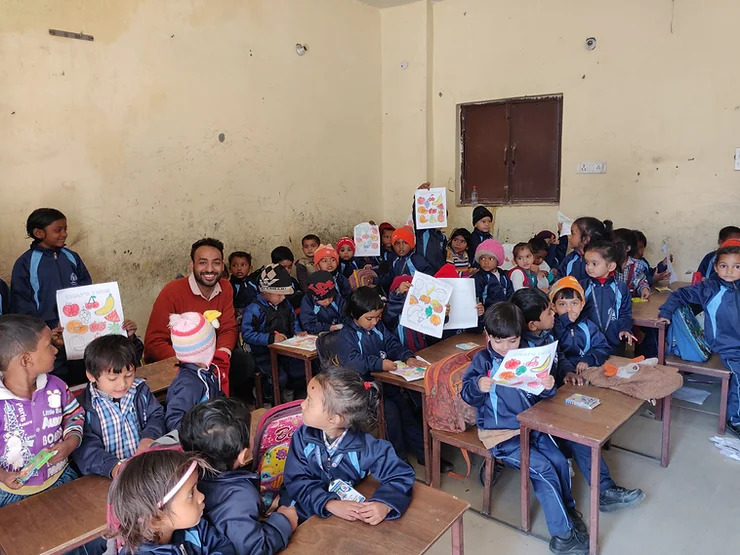
Meenu Pal, a class teacher for class 7 students from The VIDYA School, which aims to provide quality education to children from nearby slum areas, says, “The Food Funda program was beneficial not only for the students but also for me. The sessions covered small and simple things that were taught practically. In one of the sessions, we were told that having tea immediately after meals lowers iron absorption from the food. After the session, I stopped having tea with my breakfast, even though this was an old habit! I also enjoyed all the healthy recipes that were shared with us.”
To support their efforts, this Delhi-based non-profit organisation has also come up with innovative ways to find support for their activities by partnering with ‘Milaap 360’, an online fundraising platform which offers such initiatives different modes of support. The fundraiser on ‘Milaap 360’ offers the donors a variety of ways to support the Foodshaala foundation.
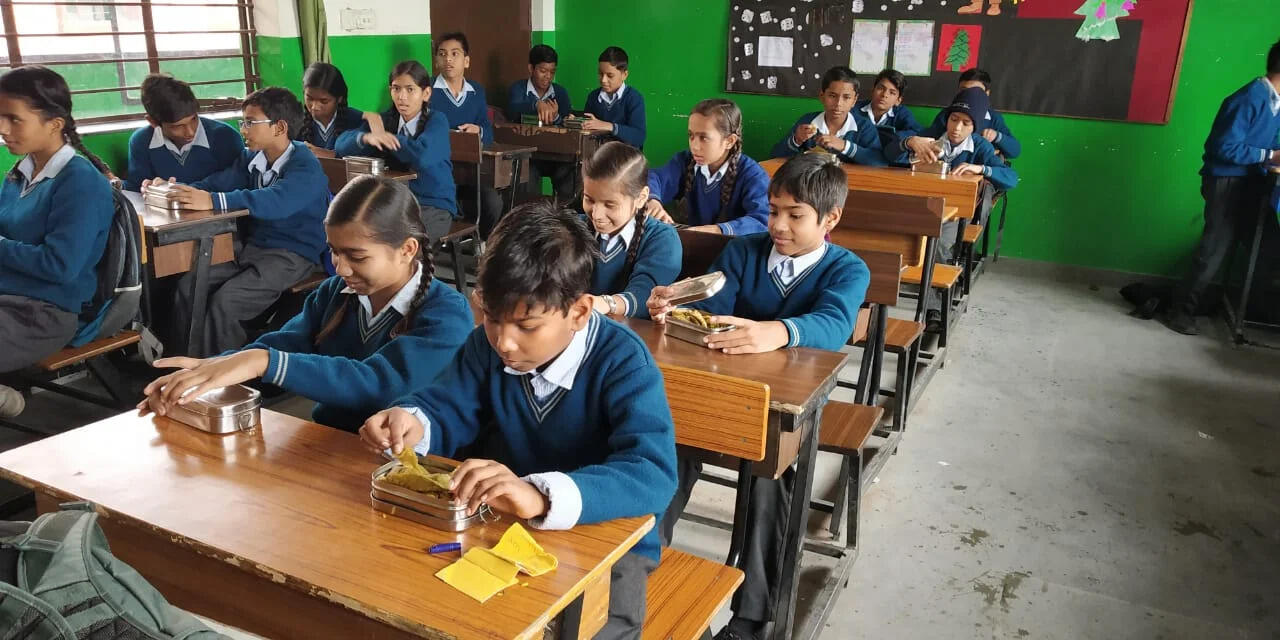
“During the pandemic, with the help of volunteers, we raised funds for relief work. We took part in competitions and won awards which also came with some financial rewards. We also engage with our donors by running live events like lucky draws, cooking sessions, auctions etc. to raise funds. We also conduct awareness sessions for people in the higher income community and the proceeds from these sessions help our work with the underprivileged,” she adds.
(Edited by Yoshita Rao)
No comments:
Post a Comment